- Home
- Joel C. Rosenberg
The Kremlin Conspiracy
The Kremlin Conspiracy Read online
PRAISE FOR JOEL C. ROSENBERG
“Joel Rosenberg has an uncanny talent for focusing his storytelling on real-world hot spots just as they are heating up. He has done it again in The Kremlin Conspiracy.”
PORTER GOSS, former director of the Central Intelligence Agency
“Marcus Ryker rocks! Breakneck action, political brinksmanship, authentic scenarios, and sharply defined characters make Joel C. Rosenberg’s Kremlin Conspiracy a full-throttle and frightening ride through tomorrow’s headlines.”
BRIGADIER GENERAL (U.S. ARMY, RETIRED) A. J. TATA, national bestselling author of Direct Fire
“Joel C. Rosenberg writes taut, intelligent thrillers that are as timely as they are well-written. Pairing a fast-paced plot with an impressive understanding of the inner workings in the corridors of power of the Russian government, The Kremlin Conspiracy is a stellar novel of riveting action and political intrigue.”
MARK GREANEY, #1 New York Times bestselling author of Agent in Place
“The Kremlin Conspiracy is my first Joel C. Rosenberg novel, and I am absolutely blown away by how good this guy is. The story moves at a blistering pace, it’s crackling with tension, and you won’t put it down until you reach the end. Guaranteed. Simply masterful.”
SEAN PARNELL, New York Times bestselling author of Outlaw Platoon
“If there were a Forbes 400 list of great current novelists, Joel Rosenberg would be among the top ten. . . . One of the most entertaining and intriguing authors of international political thrillers in the country. . . . His novels are un-put-downable.”
STEVE FORBES, editor in chief, Forbes magazine
“One of my favorite things: An incredible thriller—it’s called The Third Target by Joel C. Rosenberg. . . . He’s amazing. . . . He writes the greatest thrillers set in the Middle East, with so much knowledge of that part of the world. . . . Fabulous! I’ve read every book he’s ever written!”
KATHIE LEE GIFFORD, NBC’s Today
“Fascinating and compelling . . . way too close to reality for a novel.”
MIKE HUCKABEE, former Arkansas governor
“[Joel Rosenberg] understands the grave dangers posed by Iran and Syria, and he’s been a bold and courageous voice for true peace and security in the Middle East.”
DANNY AYALON, former Israeli deputy foreign minister
“Joel has a particularly clear understanding of what is going on in today’s Iran and Syria and the grave threat these two countries pose to the rest of the world.”
REZA KAHLILI, former CIA operative in Iran and bestselling author of A Time to Betray: The Astonishing Double Life of a CIA Agent inside the Revolutionary Guards of Iran
“Joel Rosenberg is unsurpassed as the writer of fiction thrillers! Sometimes I have to remind myself to breathe as I read one of his novels because I find myself holding my breath in suspense as I turn the pages.”
ANNE GRAHAM LOTZ, author and speaker
“Joel paints an eerie, terrifying, page-turning picture of a worst-case scenario coming to pass. You have to read [Damascus Countdown], and then pray it never happens.”
RICK SANTORUM, former U.S. senator
Visit Tyndale online at www.tyndale.com.
Visit Joel C. Rosenberg’s website at www.joelrosenberg.com.
TYNDALE and Tyndale’s quill logo are registered trademarks of Tyndale House Publishers, Inc.
The Kremlin Conspiracy
Copyright © 2018 by Joel C. Rosenberg. All rights reserved.
Cover photograph 0f man copyright © Darko Labor/EyeEm/Getty Images. All rights reserved.
Cover photograph of Kremlin copyright © Mordolff/Getty Images. All rights reserved.
Cover photograph of fighter jet copyright © Arctic-Images/Getty Images. All rights reserved.
Designed by Dean H. Renninger
The Kremlin Conspiracy is a work of fiction. Where real people, events, establishments, organizations, or locales appear, they are used fictitiously. All other elements of the novel are drawn from the author’s imagination.
For information about special discounts for bulk purchases, please contact Tyndale House Publishers at [email protected] or call 1-800-323-9400.
Library of Congress Cataloging-in-Publication Data
Names: Rosenberg, Joel C., date- author.
Title: The Kremlin conspiracy / Joel C. Rosenberg.
Description: Carol Stream, Illinois : Tyndale House Publishers, Inc., [2018]
Identifiers: LCCN 2017047720 | ISBN 9781496406170 (hc)
Subjects: | GSAFD: Suspense fiction.
Classification: LCC PS3618.O832 K74 2018 | DDC 813/.6—dc23 LC record available at https://lccn.loc.gov/2017047720
ISBN 978-1-4964-0630-9 (International Trade Paper Edition)
Build: 2018-02-02 09:27:54 EPUB 3.0.1
To my paternal grandparents and great-grandparents, who took unimaginable risks to escape from Czarist Russia in the early 1900s, and in so doing gave me and my family a chance to be born and raised in freedom.
CAST OF CHARACTERS
Americans
Marcus Ryker—former U.S. Secret Service agent; former U.S. Marine
Marjorie Ryker—Marcus’s mother
Elena Ryker—Marcus’s wife
Lars Ryker—Marcus and Elena’s son
Javier Garcia—Elena’s father
Nick Vinetti—deputy chief of mission, U.S. Embassy, Moscow; former U.S. Marine
Robert Dayton—U.S. senator (D-Iowa), member of the Senate Intelligence Committee
Peter Hwang—aide to Senator Robert Dayton and former U.S. Marine
William “Sarge” McDermott—deputy national security advisor; former U.S. Marine
Annie Stewart—senior foreign policy advisor to Senator Robert Dayton
Andrew Clarke—president of the United States
Cal Foster—U.S. secretary of defense
Richard Stephens—director of the Central Intelligence Agency
Tyler Reed—ambassador, U.S. Embassy, Moscow
Jennifer Morris—CIA station chief, Moscow
Carter Emerson—pastor, Lincoln Park Baptist Church, Washington, D.C.
Russians
Aleksandr Ivanovich Luganov—president of Russia; former prime minister; former head of the Russian Federal Security Service (FSB)
Yulia Luganova—wife of the president
Oleg Kraskin—senior aide and son-in-law to President Luganov
Marina Kraskin—Oleg’s wife; daughter of the president
Boris Zakharov—chief of staff to President Luganov
Mikhail Petrovsky—minister of defense
Dmitri Nimkov—head of FSB
Nikolay Kropatkin—deputy director of FSB
Pavel Kovalev—chief of the president’s security detail
Katya Slatsky—Olympic figure skater
Vasily Malenchenko—journalist
Galina Polonskaya—journalist
“Be polite, be professional, but have a plan to kill everybody you meet.”
GENERAL JAMES MATTIS, U.S. MARINES
“The idea that safety can be purchased by throwing a small state to the wolves is a fatal delusion.”
WINSTON CHURCHILL
Contents
Cover
Title Page
Praise for Joel C. Rosenberg
Copyright
Dedication
Cast of Characters
Epigraph
Part One Chapter 1
Chapter 2
Chapter 3
Chapter 4
Chapter 5
Chapter 6
Chapter 7
Chapter 8
Chapter 9
Chapter 10
Part Two Chapter 11
Chapter 12
Chapter 13
Chapter 14
Chapter 15
Chapter 16
Chapter 17
Part Three Chapter 18
Chapter 19
Chapter 20
Chapter 21
Chapter 22
Chapter 23
Part Four Chapter 24
Chapter 25
Chapter 26
Chapter 27
Chapter 28
Chapter 29
Chapter 30
Chapter 31
Chapter 32
Chapter 33
Chapter 34
Part Five Chapter 35
Chapter 36
Chapter 37
Chapter 38
Chapter 39
Chapter 40
Chapter 41
Chapter 42
Chapter 43
Chapter 44
Chapter 45
Part Six Chapter 46
Chapter 47
Chapter 48
Chapter 49
Chapter 50
Chapter 51
Chapter 52
Chapter 53
Chapter 54
Chapter 55
Chapter 56
Chapter 57
Chapter 58
Chapter 59
Chapter 60
Chapter 61
Chapter 62
Chapter 63
Part Seven Chapter 64
Chapter 65
Chapter 66
Chapter 67
Chapter 68
Chapter 69
Chapter 70
Chapter 71
Chapter 72
Chapter 73
Chapter 74
Chapter 75
Chapter 76
Chapter 77
Chapter 78
Chapter 79
Chapter 80
Chapter 81
Chapter 82
Chapter 83
Chapter 84
Chapter 85
Chapter 86
Chapter 87
Chapter 88
Chapter 89
Chapter 90
Chapter 91
Chapter 92
Chapter 93
Chapter 94
Chapter 95
Chapter 96
Chapter 97
Epilogue
Acknowledgments
MOSCOW—9 SEPTEMBER 1999
Louisa Sherbatov had just turned six, but she would never turn seven.
The whirling dervish had fallen asleep on the couch just before midnight, still wearing her new magenta dress, still wearing the matching ribbon in her blonde tresses, having finally crashed after a sugar high. Snuggled up next to her mother, she looked so peaceful, so content as she hugged her favorite stuffed bear. The two lay surrounded by the dolls and books and sweaters and other gifts Louisa had received from her aunts and uncles and grandparents and cousins as well as her friends from the elementary school just down the block at the end of Guryanova Street.
Strewn about the room were string and tape and wads of brightly colored wrapping paper. The kitchen sink was stacked high with dirty plates and cups and silverware. The dining room table was still littered with empty bottles of wine and vodka and scraps of leftover birthday pie—strawberry, Louisa’s favorite.
The flat was a mess. But the guests were gone, and honestly her father, Feodor, couldn’t have cared less. His little girl, the only child he and Irina had been able to bear after more than a decade and four heartbreaking miscarriages, was happy. Her friends were happy. Their families were happy. They were happy. Everything else could wait.
Feodor stared down at the two most precious people in his life and longed to reschedule this trip. He had loved planning the party with them both, had loved helping shop for the food, had loved helping Irina and her mother make all the preparations, had loved seeing the sheer delight on Louisa’s face when he’d given her a shiny blue bicycle, her first. But business was business. If he was going to make his flight to Tashkent, he had to leave quickly. So he gently kissed mother and daughter on their foreheads, picked up his suitcase, and slipped out the front door as quietly as he could.
He stepped out the main entrance of the apartment building, relieved to see the cab he’d ordered waiting for him as planned. He moved briskly to the car and gave the driver his bag to put in the trunk. The night air was crisp and fresh. The moon was a tiny sliver in the dark sky, and leaves were beginning to fall and swirl in the light breeze coming from the west. Summer was finally over, Feodor thought as he climbed into the backseat, and not a moment too soon. The sweltering heat. The stifling humidity. The gnawing guilt of not being able to afford to provide his family a simple air conditioner, much less a little dacha out in the country, where he and Irina and Louisa and maybe his parents and hers could retreat now and again, somewhere in a forest, with lots of shade and a sparkling lake to go swimming and fishing, far from the traffic and pollution and frenetic pace of the capital.
“Autumn—finally,” he half mumbled to himself as the driver slammed the trunk shut and got back behind the wheel.
Growing up, Feodor had always loved the cooler weather. The shorter days. The start of school. Making new friends. Meeting new teachers. Taking new classes. Fall meant change, and change had always been good to him. Autumn was a time of new beginnings, and he wondered what this one might bring. He was not poor, exactly, but he was certainly not successful. Still, he was content, even hopeful, perhaps for the first time in his life. Maybe one day, if he continued to work very hard, he really could save enough money to move his family away from 19 Guryanova Street, away from this noisy, dirty, run-down, depressing hovel on the south side of Moscow, and find some place quaint and quiet. Some place worthy of raising a family. With a bit of grass, maybe even a garden, where he could till the soil with his own hands and grow his own vegetables.
As the cab pulled away from the curb, Feodor leaned back in the seat and folded his hands on his chest. Autumn. He smiled. He found himself reminiscing about the autumn day he’d first laid eyes on Irina. It was the first day of middle school, twenty-two years before.
At that moment, Feodor Sherbatov—so caught up in his own world, his own memories—barely noticed the two burly men dressed in black leather jackets and black leather gloves emerging from the basement of his own building. He paid scant attention to the car parked just down the street, the white Lada with its headlights off but its engine running, to which the two men headed. The driver was smoking a cigarette and tapping on the dashboard, but Feodor would never recall the face, shrouded in shadows and a hat of some kind. When the police later asked about the men and the car, this was all Feodor could tell them.
What he did remember—what he would never forget—was the deafening explosion behind him as the taxi gained speed along Guryanova Street, heading to Domodedovo International Airport. He remembered the searing fireball. He remembered his driver losing control and crashing into a lamppost. He remembered his head smashing against the Plexiglas screen dividing the front seat from the back, and the ghastly sensation of heat as he kicked open the back door of the cab. He remembered jumping out into the street, blood streaming down his face, heart pounding furiously, and looking back just in time to see a secondary explosion as his home—the drab nine-story apartment building at 19 Guryanova Street—collapsed in a blinding flash of fire and ash.
RUBLYOVKA, RUSSIA—13 SEPTEMBER 1999
Oleg Stefanovich Kraskin awoke in a pitch-black room.
Alone and disoriented, he was covered with perspiration. His heart raced. His hands shook. His sheets were soaked through. He could not see or hear a thing nor even remember for several minutes where he was as he tried to shake off the ghoulish images of what was only a nightmare. But what a nightmare it had been.
The great hall in which he stood—once so elegant and grand, even opulent, with its massive archways and precious oil paintings and glittering chandeliers and glorio
us circular staircase going up, up, up—was ablaze, shrouded in thick, acrid smoke. His eyes stung. His lungs screamed for oxygen. His skin crackled from the blistering heat as the flames raced through the structure, greedily consuming everything in their path. Walls were collapsing. Beams from the ceiling crashed to the floor. Oleg could find no path of escape. He tried calling for help but could make no sound. Yet he could hear the bloodcurdling screams of others. And one voice he recognized immediately—it was Marina, his beloved Marina. She was suffocating. She was burning. And there was nothing he could do to save her.
Oleg pushed the covers away and jumped to his feet. Standing, trembling in the utter blackness, he felt around for his glasses. When he found them and put them on, he grabbed his watch and learned that it was not yet six in the morning. Only then did he remember that he was not in his modest downtown flat but at his parents’ palatial home in Rublyovka, the tony gated enclave of Moscow’s wealthiest and most powerful families.
Stumbling to his left, two meters and then three, he reached the far wall. Then he groped about until he felt the drapes and pulled them away from the bay windows. Fresh, soft morning light flooded the room. No longer was Oleg staring into the fiery abyss of his deepest fears but into the wooded glade in the rear of his parents’ estate. With the house so still in the early dawn hours, he could hear the swallows chirping and the buzz of insects flying about.
Oleg finally began to breathe normally again. Wiping the moisture from his face and neck, he fought to regain his equilibrium. This was not a day to dread. To the contrary, it was one for which he had planned and prepared meticulously. He went back to the nightstand, fished out a cigarette from a pack he’d bought the night before, found his lighter, and took several drags until his nerves settled. When he was finished, he took a long, hot shower, shaved, and dressed in his best suit and new leather shoes. Now he could smell breakfast. He could hear his mother padding around in her slippers, and when he emerged into the kitchen, she greeted him with a kiss and a big smile.

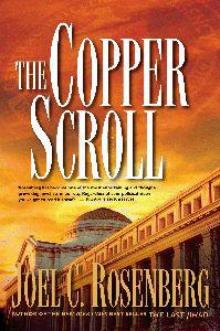 The Copper Scroll
The Copper Scroll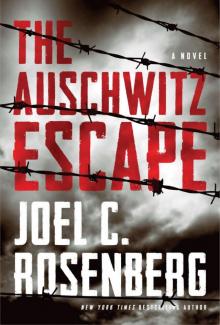 The Auschwitz Escape
The Auschwitz Escape The Last Jihad
The Last Jihad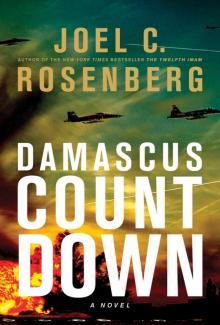 Damascus Countdown
Damascus Countdown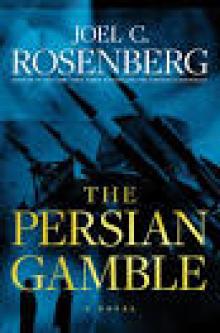 The Persian Gamble
The Persian Gamble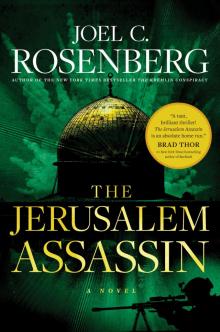 The Jerusalem Assassin
The Jerusalem Assassin Dead Heat
Dead Heat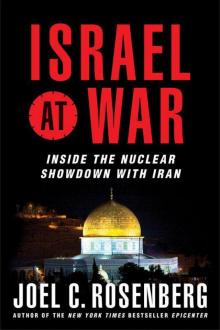 Israel at War: Inside the Nuclear Showdown With Iran
Israel at War: Inside the Nuclear Showdown With Iran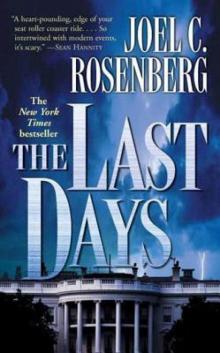 The Last Days
The Last Days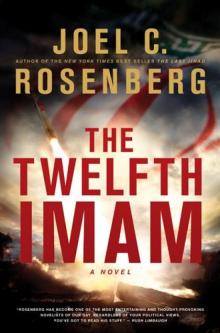 The Twelfth Imam
The Twelfth Imam Epicenter 2.0
Epicenter 2.0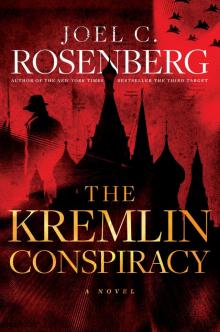 The Kremlin Conspiracy
The Kremlin Conspiracy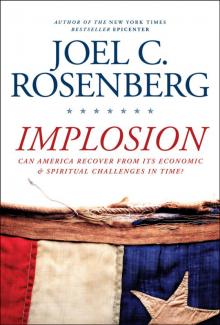 Implosion: Can America Recover From Its Economic and Spiritual Challenges in Time?
Implosion: Can America Recover From Its Economic and Spiritual Challenges in Time?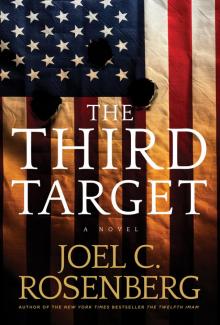 The Third Target: A J. B. Collins Novel
The Third Target: A J. B. Collins Novel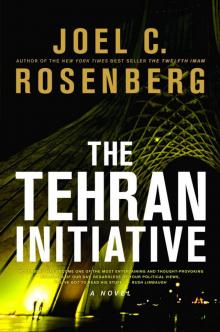 The Tehran Initiative
The Tehran Initiative Inside the Revolution
Inside the Revolution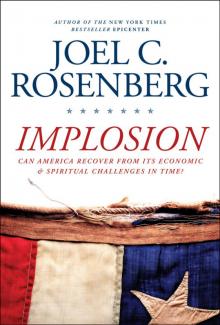 Implosion
Implosion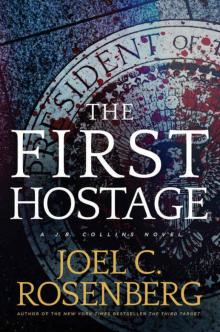 The First Hostage: A J. B. Collins Novel
The First Hostage: A J. B. Collins Novel